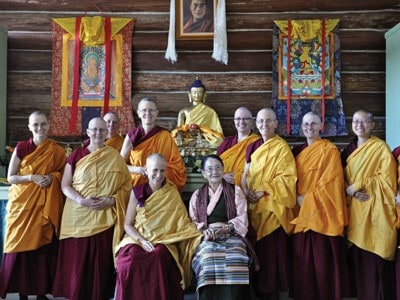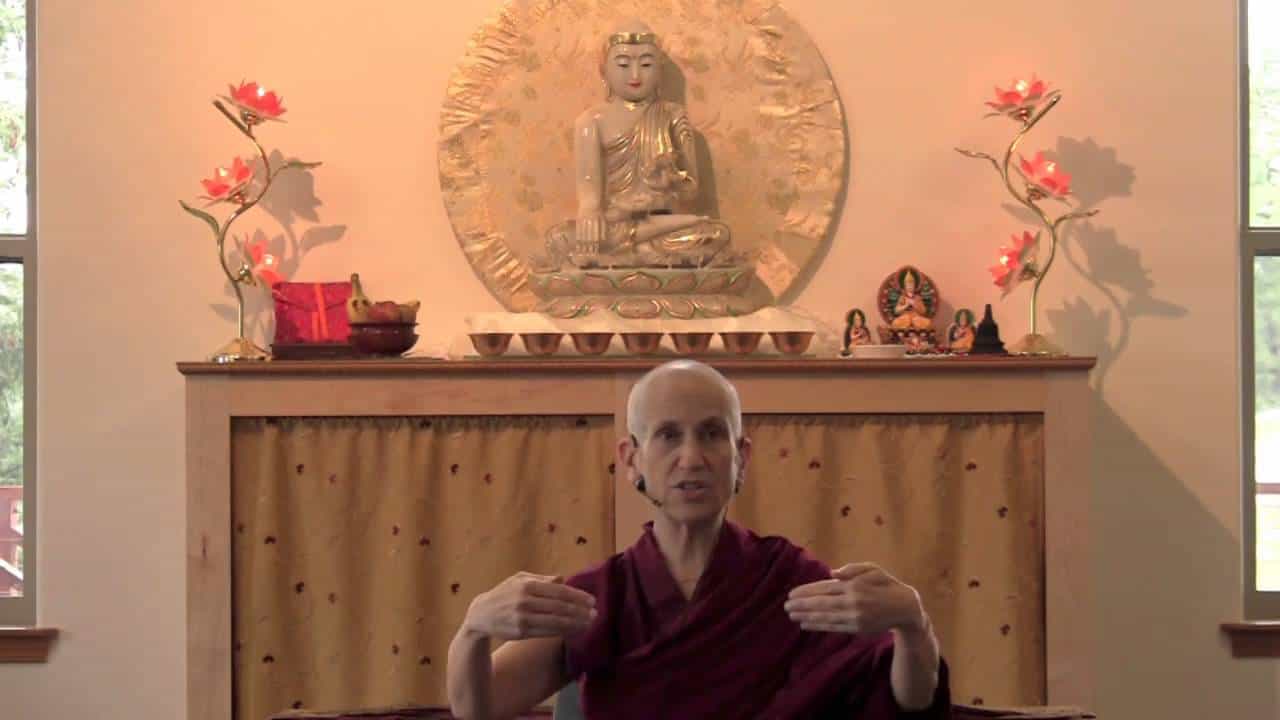To be enjoyed and loved by sentient beings
Part of a series of short talks given on Nagarjuna's Precious Garland of Advice for a King during the Manjushri Winter Retreat.
- The wish to become whatever kind of material thing people need
- Giving love and companionship
- The taking-and-giving meditation
- Aspiring to care for and cherish other living beings more than we do ourselves
When we were in Mundgod in December for His Holiness’s lamrim teachings he gave an initiation afterwards and as the commitment for that he asked us to meditate on certain verses from Nagarjuna. And I really like that kind of commitment because then you read those verses and you really think about them. And so someone asked if I would explain those verses, so I thought I would do that briefly.
The first few verses His Holiness asked us to meditate on are on the bodhicitta side of the path, and then the rest of them are on the emptiness side of the path. And these first ones (on the bodhicitta side of the path) come from Precious Garland, which is a really wonderful text.
Precious Garland has 500 verses. This is verse 483. So it’s kind of coming at the end of the text, probably near where he’s starting to dedicate the merit and really steer people…. We’ve thought about emptiness, we’ve thought about all these other topics, and the whole point of doing this is to be of benefit to sentient beings.
One of the verses says,
Like the earth, water, wind, and fire, medicinal herbs and trees in the wilderness,
May I always be an object of enjoyment for all beings just as they wish.
That’s a really beautiful thought, isn’t it? We usually think—our self-centeredness—”What can I get that will benefit me? What are the objects of enjoyment that I want, and how can I get them?” And this kind of thought of attachment is what leads us to ruin because we get completely stuck and we create so much destructive karma.
This thought is completely reversing it and saying, “May I become the object of enjoyment for all sentient beings just as they wish, and may I be whatever they need.” So he talks about the four elements: earth, water, fire, wind. I don’t think he’s meaning “may we become a handful of dirt, a bucket of water.” The four elements are what all material objects are consisting of, and so in saying that he’s saying may we become whatever kind of material thing people need. And may they be able to access all we have to give them, just like they can easily access medicinal herbs and wilderness trees. You know, in those days nobody owned the wilderness or the medicinal herbs growing out in the fields. You could just go pick things and use them as you wished. There were no limitations. So it’s saying “may I become like that for all sentient beings. Whatever they need may I be able to transform into that and become like that, and may they have access to all these material things just as they wish.” So this is focusing on material things.
The next verse focuses more on giving love and affection and companionship and so on. And so that verse says,
May I be beloved of beings and may they be more beloved to me than myself.
May their bad deeds ripen upon me and may all my virtue, without exception, ripen upon them.
So usually, like when we do the taking-and-giving meditation, we talk about giving our body and possessions and also our virtue. And when we’re giving our body and possessions we transform them not only into the material things but also into the people that other people need in their lives, in the sense of giving people the ability to make connections and so forth and experience love and affection. So here he’s saying “May I be beloved of beings.” So, may other beings care about me. May I be their beloved. But not in our usual egotistical sense of, “May they like me because I’m so emotionally needy and I can’t stand on my own two feet.” It’s not like that. But may they be fond of me because by being fond of me then we’ll have a connection and I’ll be able to lead them on the path. And that’s a beautiful way to be able to lead people on the path, when we have an affectionate connection then we can really benefit others. And that’s a very fulfilling way of engaging with others.
So, “May I be beloved of beings, and may they be more beloved to me than myself.” And so from myself, may I care and cherish other living beings more than I care about my own self. So this doesn’t mean putting ourselves down. It doesn’t mean saying that we’re worthless. Because clearly, if we think we’re worthless we can’t even generate a thought like this. So we have to have self-confidence. And remembering our buddha nature is a valid basis for having self-confidence.
And so doing that “may others be more beloved to me than myself.” Meaning that instead of my just following my self-centered mind (like that donkey with the ring in its nose that’s being led here and there by the self-centered, self-preoccupied mind) may I cherish others more than I cherish myself because by cherishing others I free myself from the bonds of my own self-centeredness. And by cherishing others I’m able to do something that really benefits them.
When I only think about myself then I use others. And any love or affection I have for them is so that they will give me something. And when we always approach others feeling “what can I get out of them?” and feeling like “I am this bottomless pit of emotional need and other people’s job is just to fill me up,” we will never be satisfied. Why? Because we don’t believe in ourselves. And we have to learn how to be kind to ourselves. We need to learn how to love ourselves and to see ourselves as valuable human beings because we have the ability to practice the path and become buddhas. Because we have the ability to contribute to the welfare of others and make a positive connection with them that can really be beneficial for self and others.
It’s talking about a different way of relating to people, coming from the feeling of being a whole, confident person now because we have the buddha potential. We may not be buddhas yet, we’re not perfect beings. That’s okay. But we have that nature and that potential. And so based on that we can approach the world and approach other living beings in a positive way. In a way of, “What can I give to you? What can I share with you? How can I help you? How can I listen to what’s important to you? How can I listen to what you need?” Instead of just being involved in my needs and my wants.
I have wants and I have needs, but the way to fulfill them is to learn how to make positive connections with others. And making positive connections with others entails cherishing them and saying, “You’re a living being just like me. You have needs and wants and feelings and concerns just like me. How can I contribute to your well-being?” Because when we contribute to the well-being of others we feel fulfilled in ourselves. And they’ve done many psychological studies on this, that people feel much happier when they’re able to be generous to others than when they just think about themselves. I mean, they’ve done studies about this. Buddha knew it a long time ago. But still, the thing is, we have to learn it. And approaching people with kind of “How can I have a healthy give and take relationship with you because I care about you as a human being,” or as an animal, as some kind of sentient being. Then that becomes something that’s very fulfilling for us and very fulfilling for the other person.
So let’s try and go in that direction as our way of engaging with others.
Okay? Let me just read these two verses again:
Like the earth, water, wind, and fire, medicinal herbs and trees in the wilderness,
May I always be an object of enjoyment for all beings just as they wish.May I be beloved of beings and may they be more beloved to me than myself.
May their bad deeds ripen upon me and may all my virtue, without exception, ripen upon them.
I’ll talk about the last two lines next time.
Venerable Thubten Chodron
Venerable Chodron emphasizes the practical application of Buddha’s teachings in our daily lives and is especially skilled at explaining them in ways easily understood and practiced by Westerners. She is well known for her warm, humorous, and lucid teachings. She was ordained as a Buddhist nun in 1977 by Kyabje Ling Rinpoche in Dharamsala, India, and in 1986 she received bhikshuni (full) ordination in Taiwan. Read her full bio.


